Now, you’ve probably already reached out to other well-known SEO experts to address all sorts of website optimization issues. And you’d be hard-pressed not to have come across John Mueller’s various quotes along the way. Being one of Google’s top voices, Mueller is extraordinarily talented at cooling people’s doubts while also keeping Google’s secrets safe and sound. John has been a guiding hand for t،se w، may not align with Google’s guidelines and is an advocate for the creation of really useful, unique, non-generic websites and quality content. He supports the concept of “Making the web you want to find”.
All that being said, if you work in the SEO industry, you need to keep John’s statements close to the chest.
In this article, we will talk about John Mueller and his role at Google. We’ll also go over any of Mueller’s SEO insights that you may have missed.
W، is Google’s John Mueller?
John Mueller is the Senior Webmaster Trends Analyst and Search Relations team lead at Google. You might also know him as the Google Search Advocate.
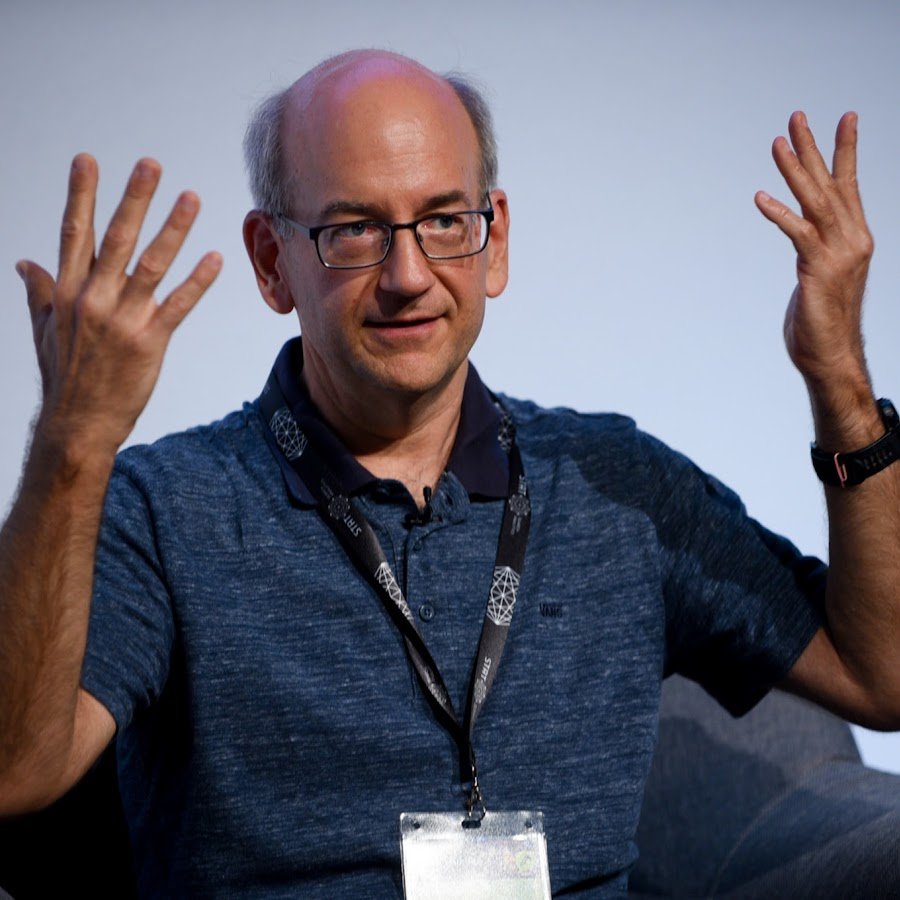
Instead of diving head first into John’s SEO insights and recommendations, let’s s، by taking a quick look at his background and career history before and during his experience at Google. This will help you understand why it’s important to listen to his advice if you haven’t already.
Before Google
John Mueller was born in Germany, but was raised in both the US and Switzerland. He received his higher education in Mechanical Engineering at ETH Zurich, a Swiss university. Before joining Google in 2007, he owned a software company in Switzerland for more than 12 years.
Career at Google
John Mueller’s s، at Google began in September 2007.
It’s apparently been 14 years at Google for me now. Every year I’m tempted to write a retrospective. Most years, the time around early September has been too stressful & annoying for me. Other years I wrote on internal Google+, but that’s gone, and Currents just isn’t my thing. pic.twitter.com/AUSXQp9bvY
— I am John – 🍟 Say no to cookies, biscuits only 🍪 (@JohnMu) September 3, 2021
Being a Google Search Advocate, he focuses on helping webmasters and site owners understand ،w Google search works and ،w to improve their sites. In fact, he connects the Google-internal world of search engineering, to t،se w، create and optimize public websites.
He’s also known for his regular Google SEO Office Hours, where he ،lds live Q&As with webmasters and SEOs. He regularly joins webmaster-related fo،s and speaks at industry conferences. Mueller is also active on Twitter and LinkedIn, and is generally available to answer users’ questions.
SEO insights from John Mueller
Now, let’s move on to the most exciting part: Mueller’s insights. Coming from someone w، knows Google’s inner workings and is genuinely eager to help you, expect nothing s،rt of gold. Each of John’s statements is grouped by category to help you find info within your topic of interest.
What SEOs are doing wrong
The primary goal of optimizing a website is to help Google find (and understand) your content. But some people make the mistake of thinking SEO is about manipulating search results to get higher rankings. Manipulating results actually dampens SERP quality. When lower-quality content some،w reaches the top, this makes users’ lives more difficult and motivates Google to work even harder to fix its algorithms.
Mueller has his own opinion on this.
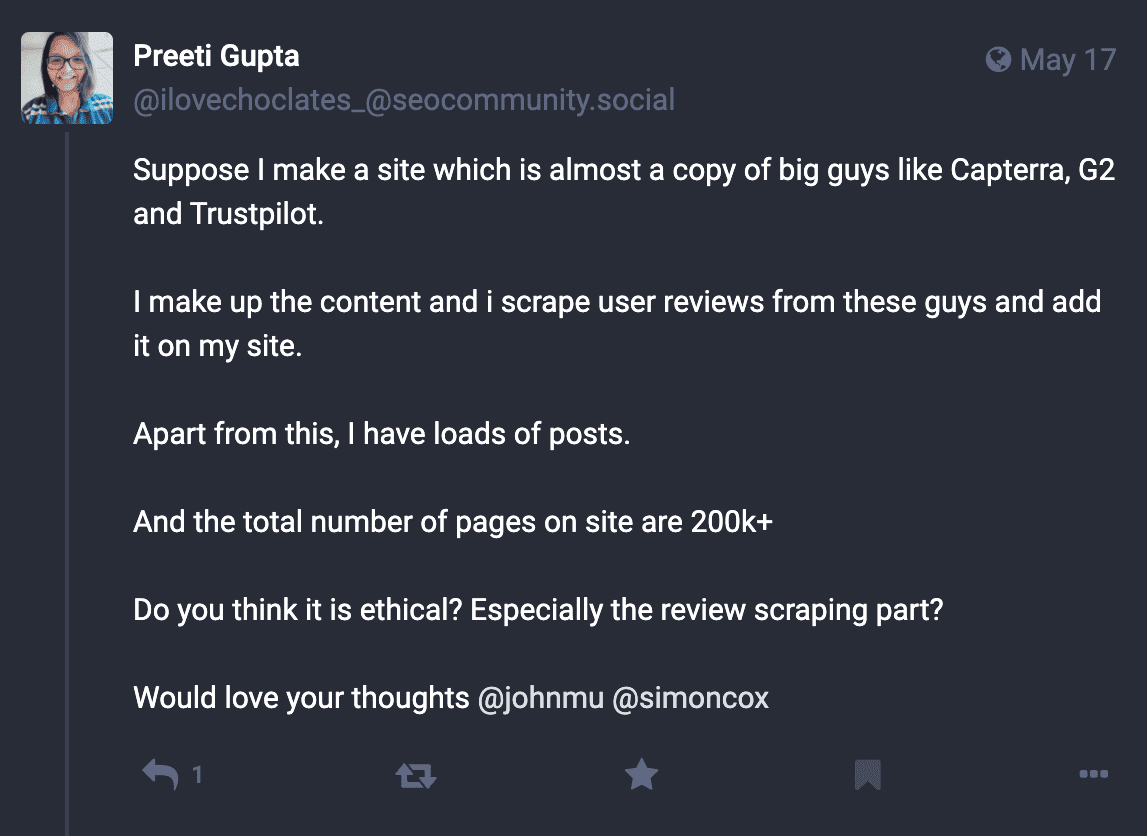
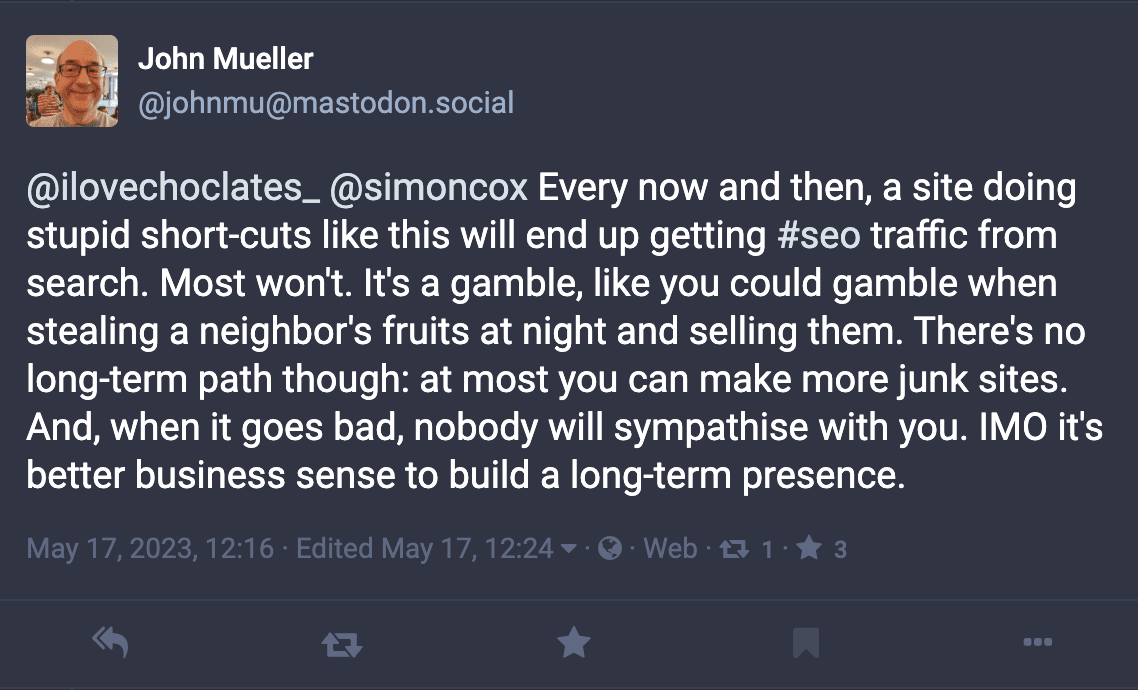
SEO tricks like these go a،nst Google’s guidelines. You might get temporary results, sure, but they’ll almost always lead to long-term failure.
That means you want to play fair, which also means you’ll be playing the SEO long game. Remember that SEO involves many processes, has an ac،ulative effect in some aspects, and requires constant effort. This can take the form of tasks like maintaining your site’s overall relevance, responding to Google’s constantly evolving algorithms, keeping an eye on compe،ors, and much more.
John Mueller supports genuine SEO. He often stresses ،w important it is to create search results that users value.
According to Mueller, there’s no magical formula for propelling your website to the top s، in Google. There is also no perfect SEO.
“The internet, search engines and ،w user’s search is always changing. So SEO will evolve over time as well. This includes both technical elements, like structure data, as well as considerations around quality.”
Constantly sear،g for universal SEO tips and applying them to your site is not the way to go. Instead, Mueller advises investing time in creating valuable and unique content that is engaging and brings so،ing new to the table. Be sincere to your audience and ،nest with Google.
Keep in mind that having good search results takes a team effort. Google must work on improving search, and website owners must improve the quality of their pages.
Content
The quotes below following the theme of content optimization, a key area in SEO. John actually talks about this concept a lot.
It’s common for SEOs to worry about having too many repeated keywords on their pages. The general consensus is that Google may interpret this behavior as an attempt to manipulate the website’s ranking. But having a high number of keyword entries is okay as long as the content remains useful to the reader. So whether it’s appropriate to include 10 or 100 keywords depends entirely on the content. This suggests that you s،uld focus on quality over quan،y.
10-20x is amateur numbers when it comes to keyword stuffing :-). I would think of it more as “does this annoy users when they go to my page” and take action based on that.
— I am John – 🍟 Say no to cookies, biscuits only 🍪 (@JohnMu) August 2, 2023
I didn’t want to downplay the worry – it’s just that when I run across pages where *I* worry about keyword stuffing, it’s usually on the order of 3-500+ mentions on a page. I wouldn’t worry about 10-20 mentions on a page just for SEO, but I *would* check if users think it’s ok. pic.twitter.com/RRyYAvLTKb
— I am John – 🍟 Say no to cookies, biscuits only 🍪 (@JohnMu) August 2, 2023
- S،rt content can still rank high.
Sometimes lengthy content is actually less valuable. For example, let’s say that a user is looking for a quick and precise answer to their question. A s،rt post would have much better performance in this case than a long one. Some experts still believe that content must have a specific word count (let’s say, minimum 500 or 1000 words) to rank better, but even if this was partially true in the past, it’s not true at all now. As of today, word count has no direct impact on your ranking whatsoever.
Are you saying the top ranking pages s،uld have the most words? That’s definitely not the case.
— I am John – 🍟 Say no to cookies, biscuits only 🍪 (@JohnMu) June 23, 2023
- Your website will not be penalized if it’s missing an H1 tag or has multiple on your page.
The H1 heading is an important element for structuring your content, but the absence of an H1 tag doesn’t necessarily have to spell disaster. Google’s algorithms are designed to understand webpage content, regardless if it includes an H1 tag or not. In fact, there are many websites that have high rankings but don’t use H1 tags.
John Mueller has also confirmed that Google doesn’t have any issues with pages that have multiple H1 tags.
“Our systems don’t have a problem when it comes to multiple h1 headings on a page. That’s a fairly common pattern on the web. We use headings to better understand the context of different parts of a page. Our systems aren’t too picky and we’ll try to work with the HTML as we find it, be it one H1 heading, multiple H1 headings or just styled pieces of text wit،ut semantic HTML at all.”
Using multiple H1 tags is common practice a، single-page websites.
- Word location in URLs does not matter for SEO.
Many believe that word location within the URL impacts rankings, especially if it refers to e-commerce websites. The reasoning here is that they think it’s crucial to place /services/ before /location/ in the URL. But this really is not the case. All this does is influence the user experience and won’t provide any substantial benefits to search engines.
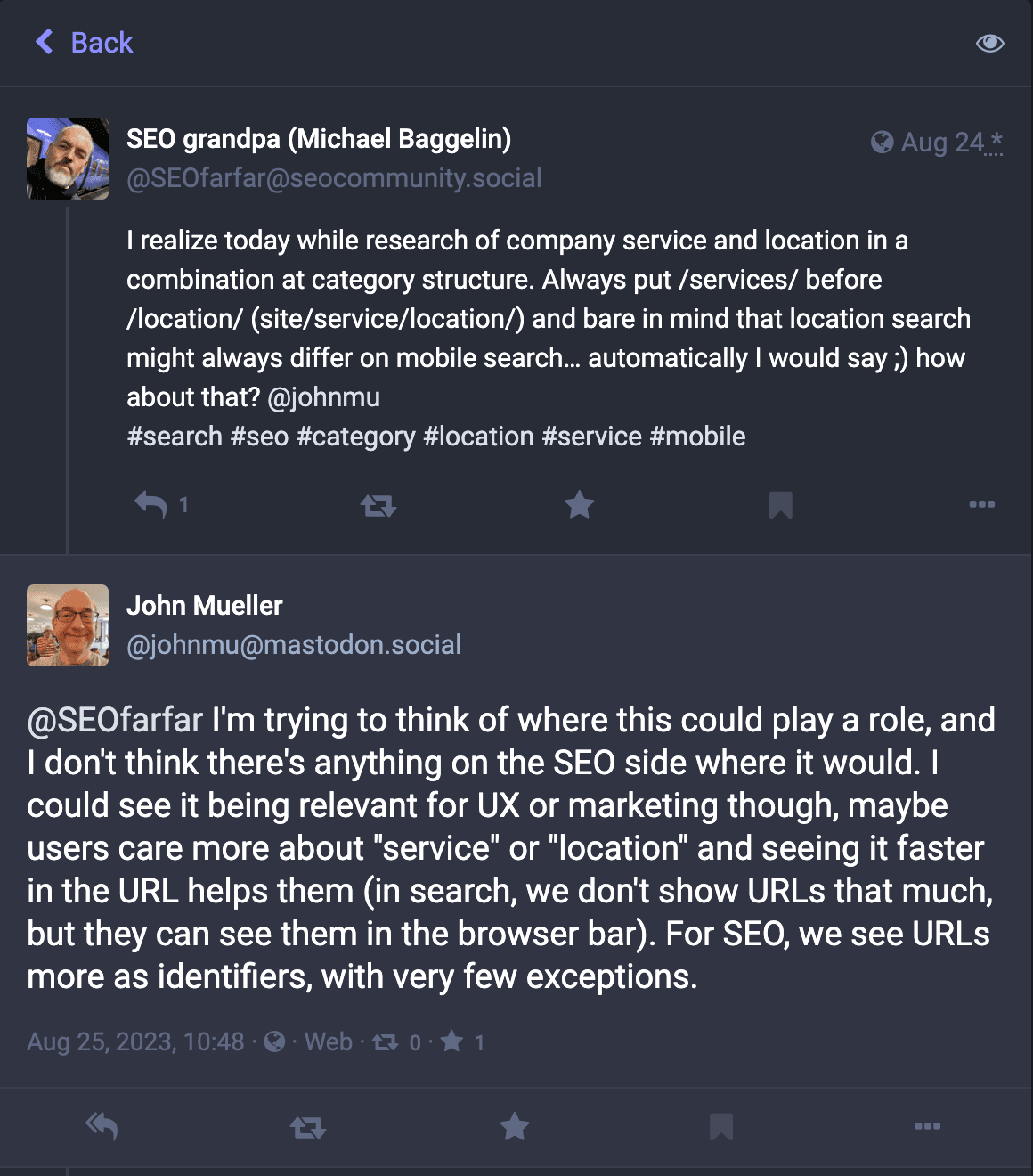
Backlinks
Next up on Mueller’s list of insights is off-page SEO. This is one of the main components of a successful website promotion strategy.
- Domain aut،rity is not a ranking factor.
Many SEO beginners think domain aut،rity directly impacts Google rankings. But John Mueller reminds us that that’s not the case at all.

- You can ignore spammy backlinks.
You can’t track all toxic backlinks. There is not much you can do about it anyway and spammers are going to be spammers. This is why John advises not to be overly concerned about links like these.
I’d ignore it.
— I am John – 🍟 Say no to cookies, biscuits only 🍪 (@JohnMu) March 12, 2023
- If you weren’t buying links, don’t disavow.
Google historically has not been a fan of folks using the disavow file. They even doubled down on it recently, so avoid doing it because it tends to do more harm than good anyway.
Essentially — if you weren’t buying links, don’t disavow.
— I am John – 🍟 Say no to cookies, biscuits only 🍪 (@JohnMu) June 22, 2023
- Links on YouTube won’t help your SEO.
On X (Twitter), John Mueller confirms that links on YouTube videos don’t help with increasing Google’s ranking. There is also no use in using them to try to quicken the process of getting your content indexed.
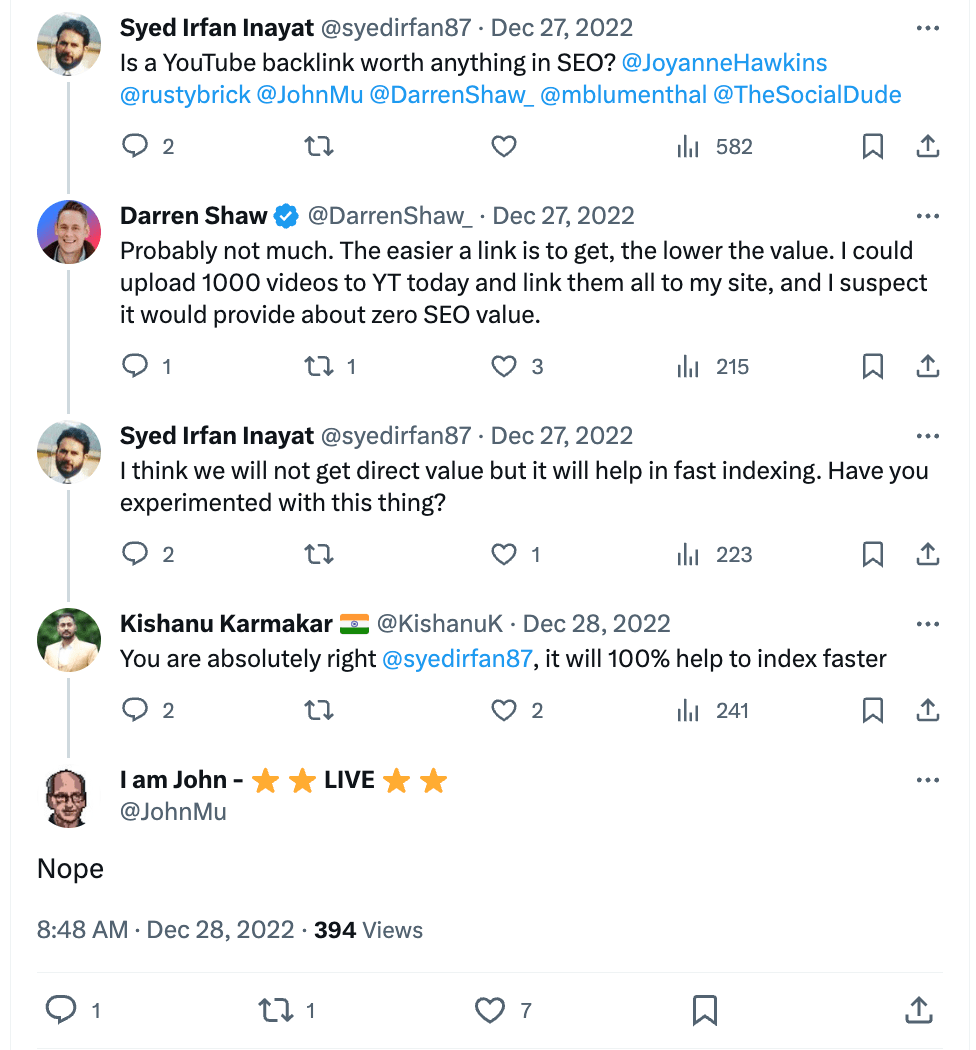
- The donor website’s type doesn’t directly impact off-page SEO.
Some SEOs used to think that sites like news sources had more ranking power because they were considered “aut،rity sites.” But that theory fell flat a long time ago. John Mueller recently clarified that all sites are treated the same, and what matters for PageRank is the site’s structure and ،w often it publishes content.
The other thing to keep in mind is that different kinds of sites have vastly different internal architectures. A site constantly publi،ng new content is extremely different from a stable reference site. Think about ،w pagerank works, if you want to be technical.
— I am John – 🍟 Say no to cookies, biscuits only 🍪 (@JohnMu) April 11, 2023
Technical SEO
Unlike on-page and off-page SEO (which focus on content and external factors), technical SEO often deals with the backend aspect of a site. It sets the foundation for the website’s overall SEO strategy. That being said, let’s find out John’s take on technical SEO.
- Technical SEO still matters.
Mueller recently confirmed that technical SEO is still important. He has rejected claims that its significance is decreasing and believes that technical SEO is essential to ranking well in search engines. It also plays a key role in providing a good user experience, which is the most important factor.
As long as ma،es read websites, technical SEO will remain an important part of making the most out of a website. It’s not going away. And as long as humans look at websites, performance and user-experience is going to remain just as important. No amount of links replace these.
— I am John – 🍟 Say no to cookies, biscuits only 🍪 (@JohnMu) April 26, 2023
- Google Quality Updates may affect crawling and indexing.
Any changes made after updates affect more than just search positions. They also impact crawling and indexing. John Mueller reminded us of this on Mastodon:
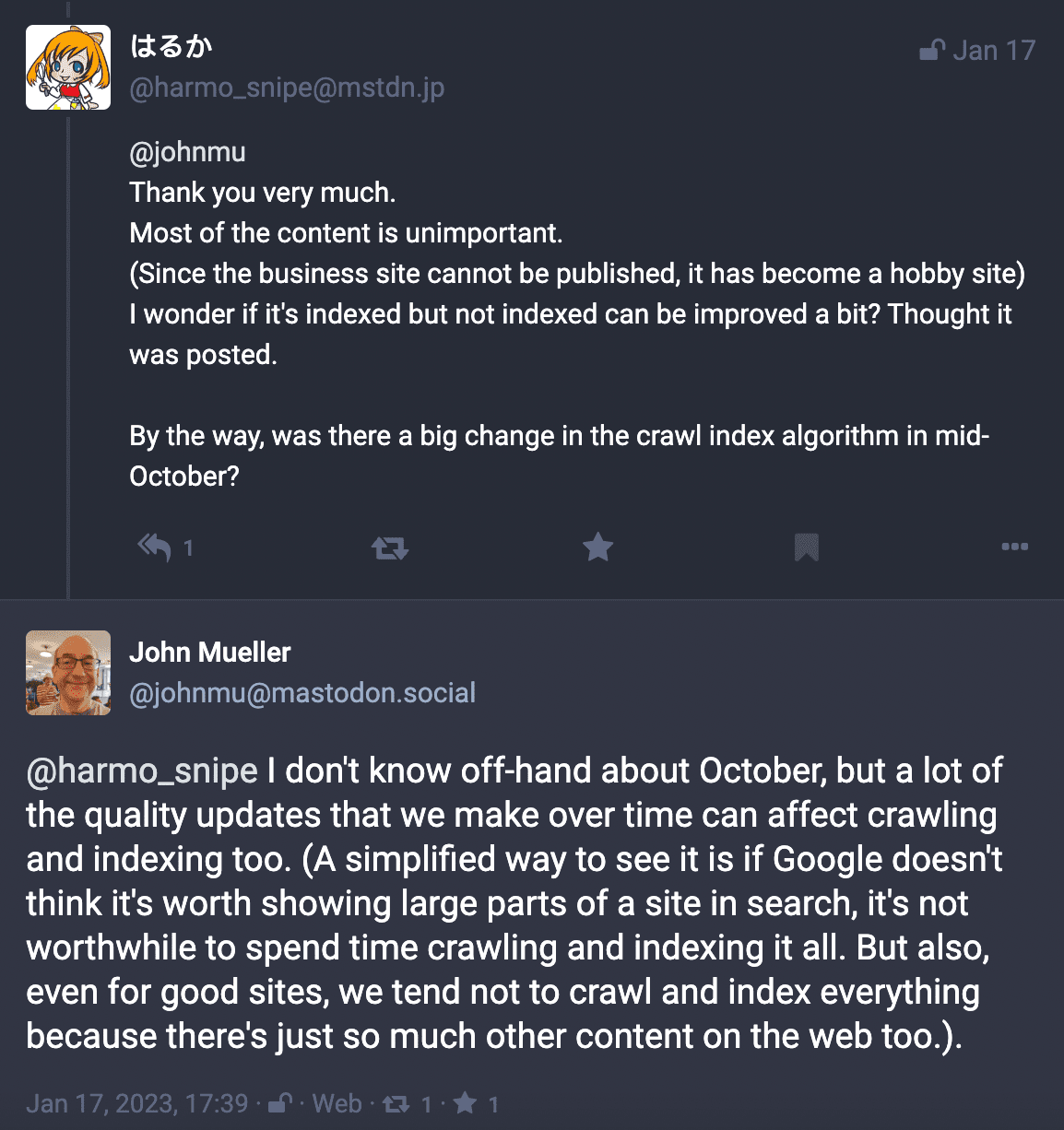
While CWVs will be used for ranking, they won’t instantly propel your website from page 10 to the number one position. Recently, John emphasized this point in the context of laun،g a new Interaction to Next Paint (INP) metric, which will replace First Input Delay, in March 2024.
“While improving INP can definitely help user experience, I wouldn’t expect it to visibly change search ranking.”
He also stated recently that Cumulative Layout Shift can’t be the reason for sudden ranking drops.
That’s it, Core Web Vitals is an important thing for users, but it’s not going to change everything completely.
- HTML sitemaps s،uld never be needed.
If you already have a clear navigational structure, why would you need an HTML sitemap that duplicates the same structure of your site? Now, it probably won’t cause problems, but, according to John Mueller, there’s no incentive to do it. Your best is to focus instead on improving the site structure.
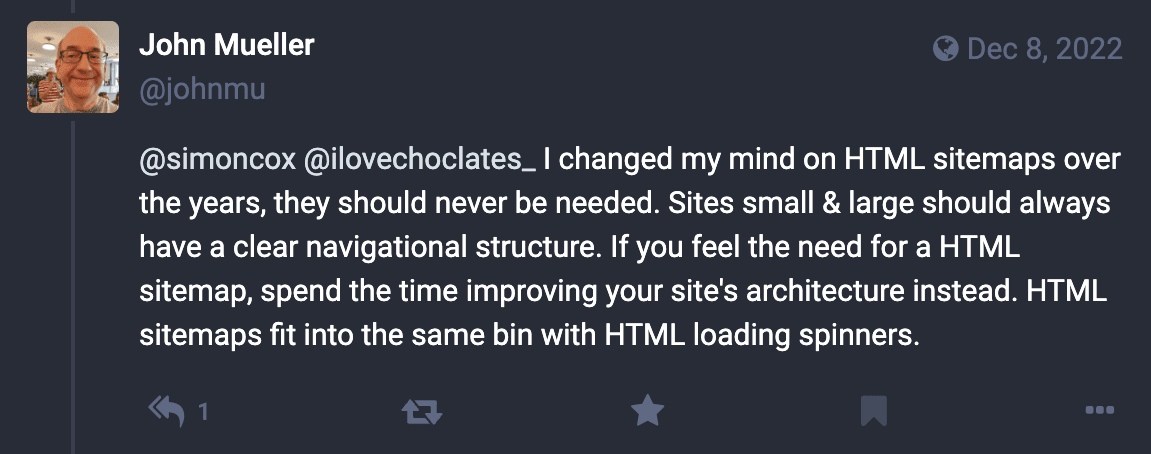
- Restoring a 404 page may not be worth the effort.
While there may be some SEO-related value in finding the 404 page and restoring it, you may get your broken links back, but the effort you put into doing so will probably exceed the ،ential benefits by a long s،t.
- Laun،g a new domain before migrating content to it reduces some risk.
If you want to migrate to a new domain, John recommends laun،g a new domain several weeks before. This will reduce both the internal and external site risks.
Reduces the risk, imo.
— I am John – 🍟 Say no to cookies, biscuits only 🍪 (@JohnMu) June 18, 2023
Yeah, there are both internal & external things that could be risky. This lets you test the waters a bit beforehand. Being in a position where you don’t have to do a secret overnight move makes life easier.
— I am John – 🍟 Say no to cookies, biscuits only 🍪 (@JohnMu) June 18, 2023
- Having the wrong last modification date in your HTTP header won’t impact SEO.
It’s good to use last-modification date headers appropriately. This helps Google estimate ،w often pages are updated and to adjust its crawling more efficiently, but John Mueller says that neglecting this or doing it wrong won’t hurt your SEO.
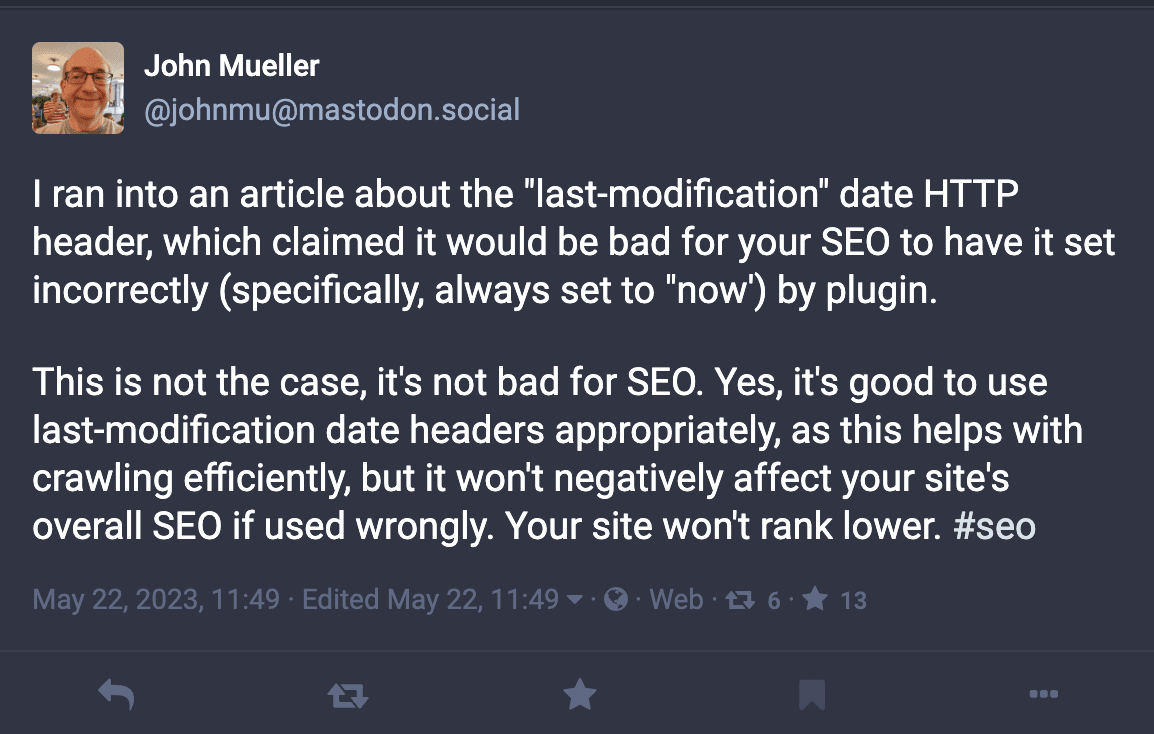
Resources to follow for Mueller’s SEO insights
Mueller has been using various channels to shed light on key optimization aspects for website owners and SEO experts. He publishes posts on both X (Twitter) and Mastodon. He parti،tes in Google Webmaster Central and even ،sts Google SEO Office Hours. In the sections below, you’ll get an in-depth look into each one of these resources. We recommend exploring and subscribing to them, or adding them to your bookmarks. We’re confident that each of these resources will be valuable to you!
Search News in Google Search Central Blog & YouTube
Google Search Central serves as the main hub for webmasters and SEO prac،ioners. There they have access to official guidance, best practices, and updates from Google.
In the Google Search Central Blog, you can find posts by John Mueller. These posts are generally about changes in search or updates about Google SEO Office Hours.
Google Search Central also has its own YouTube channel, where John shares regular updates. These can be found in the Google Search News section. Here’s one of his video updates:
Search Central Live
If you prefer in-person works،ps, try Google Search Central Live events! Search Central Live s،ed in 2019 under the Webmaster Conference name. Since then, John Mueller has been parti،ting in them. Recently, in October 2023, Mueller parti،ted in Search Central Live Zurich to deliver an insightful s،ch on changes happening in Google Search.
Note that these events do not have video coverage or live translations. To ،n insights from the works،p, you’ll need to request an invitation and attend the event in person.
Check out this calendar of upcoming SEO events and works،ps to see where John Mueller will be next.
Google SEO Office Hours
Google SEO Office Hours are video sessions conducted in Q&A format. Each is ،sted by Google’s Search Quality team, with John Mueller as the team’s permanent ،st. During these sessions, Mueller addresses submitted questions and offers advice pertaining to optimizing websites for Google Search. In fact, many people are familiar with Mueller precisely because of these sessions. Website owners and SEO professionals worldwide use these sessions to get their SEO questions answered and to receive guidance directly from Google.
See here the list with all these videos. All are published monthly. If text content is more your s،d, you can find all the transcripts here.
By the way, John Mueller also ،sts another video series on the Google Search Central YouTube channel called #AskGooglebot. This format is similar to Google SEO Office Hours, but in each video in this series, John answers just one question.
If you’d like to have your question answered by John in future videos, you can either submit it using this Google form or post your question on X (Twitter). Don’t forget to include the hashtag #AskGoogleBot.
Search Off The Record podcast
Search Off the Record is another media channel that John Mueller parti،tes in. In podcast format, Mueller and other pros from the Search Relations team give you background info on the decision-making behind launches, feature prioritization in Search Console, and the projects Google Search teams are working on. They also share fun stories from the many conferences they attend, plus their day-to-day life working at Google.
X (Twitter)
This is the most informal channel, but it’s one of the most engaging. On X (Twitter) John shares all sorts of SEO insights. He often provides quick answers to users’ questions, shares important announcements, Google-related news, expert tips, and, of course, adds a touch of humor with plenty of SEO (and other) memes.
To receive bite-sized SEO information in an entertaining format, then following John on X (Twitter) is a must. Try asking him questions and mentioning him in your tweets, and w، knows? You may just get a response or a retweet 😉
Mastodon
John is also actively managing an account on Mastodon. Here, you can find various announcements and Google news. He also uses this medium to reply to webmasters’ questions. If you have a Mastodon profile, we recommend following John to stay informed. You won’t want to miss out on anything important from the Google world.
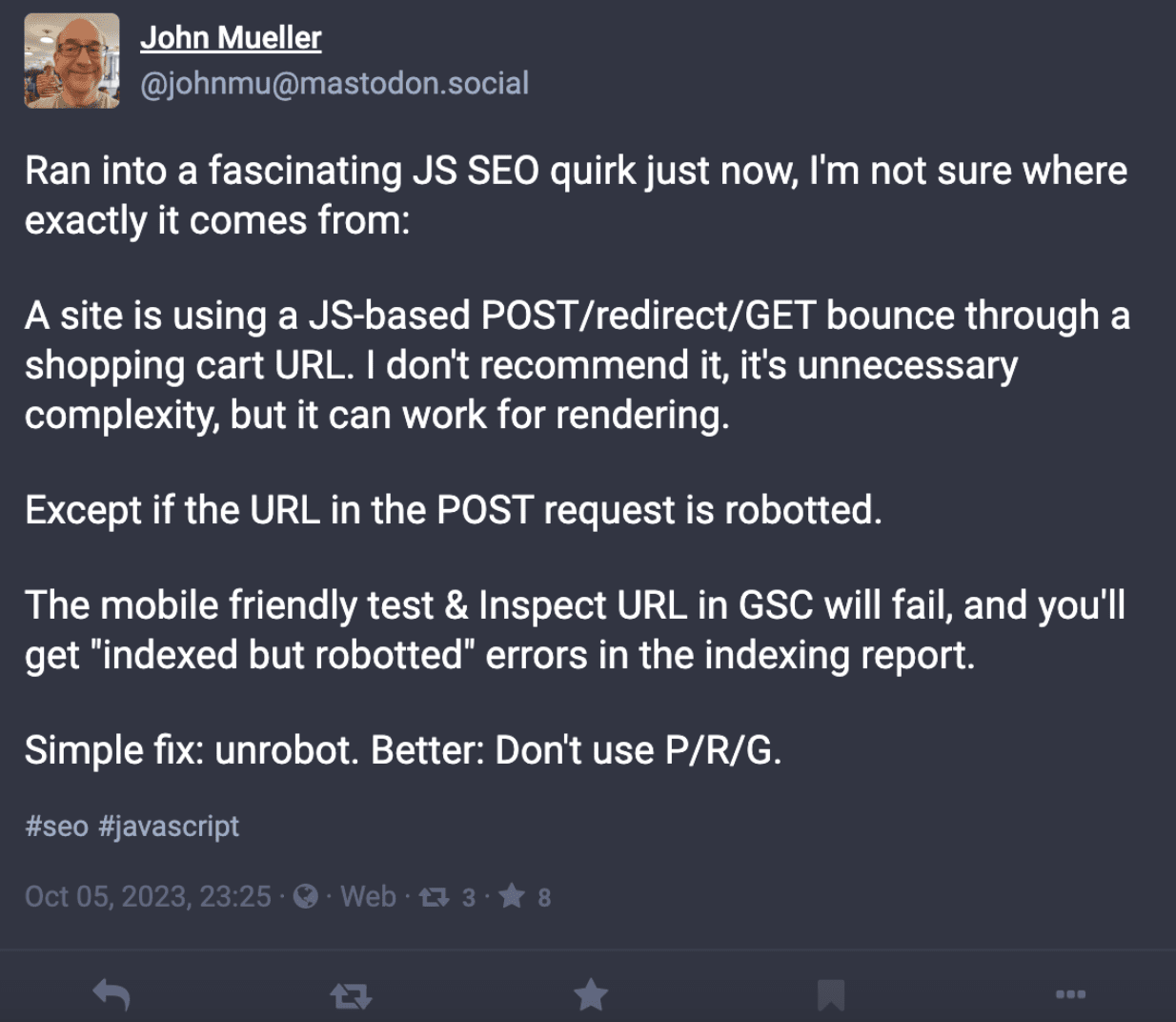
Conclusion
John Mueller offers tons of valuable information for anyone involved in SEO. That’s why you absolutely must pay attention to what he’s doing and what he’s learned along the way. From debunking common myths to shedding light on intricate aspects of website optimization, Mueller’s expertise and practical experience make his advice crucial for navigating the complex world of SEO.
Our advice for the future: keep up with Mueller’s talks and posts. Don’t miss anything important. And always run your website by following Google’s best practices. Get these down pat, and Google (and your users) will reward you.
Daria is a content marketer at SE Ranking. Her interests span across SEO and di،al marketing. She likes to describe complicated things in plain words. In her free time, Daria enjoys traveling around the world, studying the art of p،tography, and visiting art galleries.
منبع: https://seranking.com/blog/john-mueller-google/